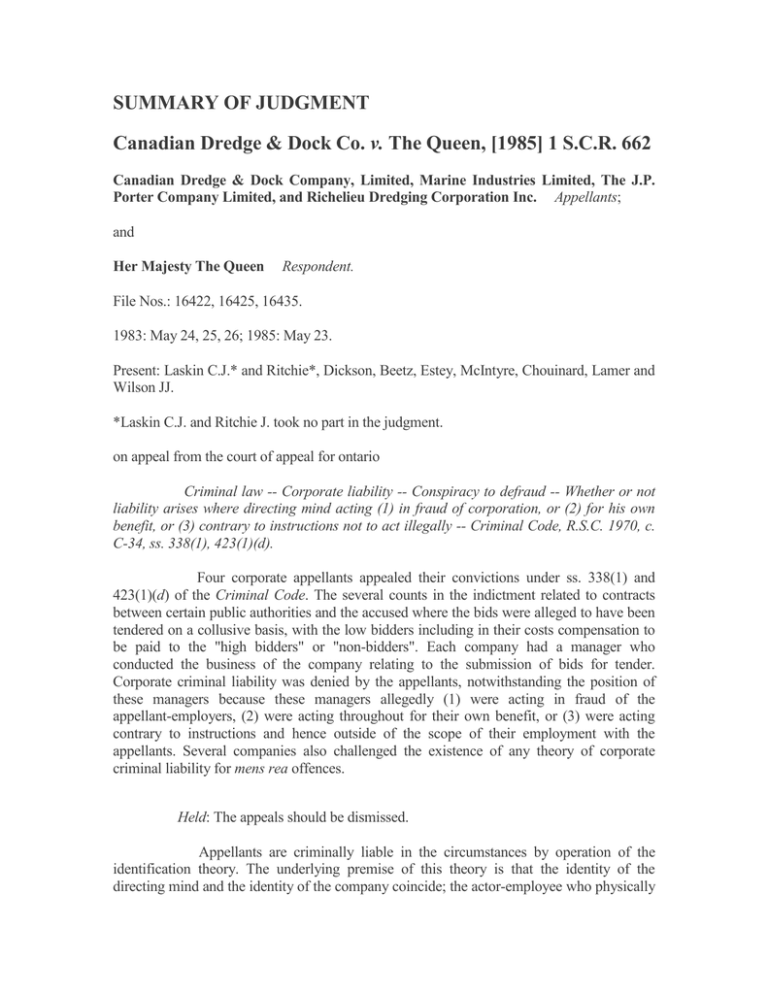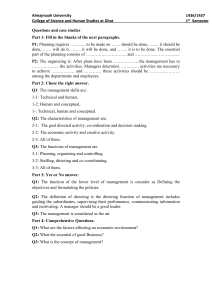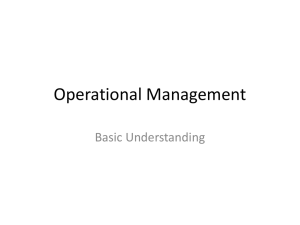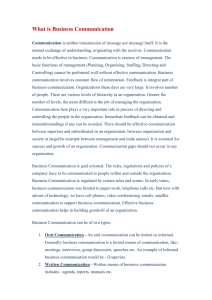SUMMARY OF JUDGMENT v.
advertisement

SUMMARY OF JUDGMENT Canadian Dredge & Dock Co. v. The Queen, [1985] 1 S.C.R. 662 Canadian Dredge & Dock Company, Limited, Marine Industries Limited, The J.P. Porter Company Limited, and Richelieu Dredging Corporation Inc. Appellants; and Her Majesty The Queen Respondent. File Nos.: 16422, 16425, 16435. 1983: May 24, 25, 26; 1985: May 23. Present: Laskin C.J.* and Ritchie*, Dickson, Beetz, Estey, McIntyre, Chouinard, Lamer and Wilson JJ. *Laskin C.J. and Ritchie J. took no part in the judgment. on appeal from the court of appeal for ontario Criminal law -- Corporate liability -- Conspiracy to defraud -- Whether or not liability arises where directing mind acting (1) in fraud of corporation, or (2) for his own benefit, or (3) contrary to instructions not to act illegally -- Criminal Code, R.S.C. 1970, c. C-34, ss. 338(1), 423(1)(d). Four corporate appellants appealed their convictions under ss. 338(1) and 423(1)(d) of the Criminal Code. The several counts in the indictment related to contracts between certain public authorities and the accused where the bids were alleged to have been tendered on a collusive basis, with the low bidders including in their costs compensation to be paid to the "high bidders" or "non-bidders". Each company had a manager who conducted the business of the company relating to the submission of bids for tender. Corporate criminal liability was denied by the appellants, notwithstanding the position of these managers because these managers allegedly (1) were acting in fraud of the appellant-employers, (2) were acting throughout for their own benefit, or (3) were acting contrary to instructions and hence outside of the scope of their employment with the appellants. Several companies also challenged the existence of any theory of corporate criminal liability for mens rea offences. Held: The appeals should be dismissed. Appellants are criminally liable in the circumstances by operation of the identification theory. The underlying premise of this theory is that the identity of the directing mind and the identity of the company coincide; the actor-employee who physically committed the offence is the ego of the corporation. Therefore, even in mens rea offences, if the court finds the officer or managerial level employee to be a vital organ of the company and virtually its directing mind in the sphere of duty assigned him so that his actions and intent are the action and intent of the company itself, the company can be held criminally liable. The wrongful action of the primary representative, by attribution to the corporation, creates primary rather than vicarious liability. The identity doctrine merges the board of directors, the managing director, the superintendent, the manager or anyone else to whom was delegated the governing executive authority of the corporation, and the conduct of any of the merged entities is thereby attributed to the corporation. A corporation may, by this means, have more than one directing mind. The directing mind, as a prerequiste to the theory's operation, must act within the scope of his authority, that is, his actions must be performed within the sector of the corporate operation assigned to him. The sector may be functional, or geographic, or may embrace the entire undertaking of the corporation. Terminological problems arise from the use of the phrase "scope of employment". It is no defence to the application of the identification doctrine that a criminal act by a corporate employee cannot be within the scope of his authority unless expressly ordered to do the act in question. Such a condition would reduce the rule to virtually nothing. Liability can arise whether or not there be formal delegation, awareness of the board or directors, or express prohibition. A corporation in reality has these elements: the legal entity, the personal shareholder, and the employee. By reason of the identification theory, the criminal penalty will extend, directly or indirectly, to all three which is quite unlike the situation of a natural proprietor where only two of these elements are present. Imposition of criminal liability is tolerable for a community where reality dictates corporate criminal accountability in certain circumstances. Each company had a directing mind and the fact that he may have defrauded the corporate employer, acted in part for his own benefit, or acted in breach of instructions did not remove the company's criminal liability in the circumstances. The presence of general or specific instructions prohibiting the conduct in question was irrelevant in determining the parameters of the identification theory. Since the corporation and the directing mind became one, the prohibition directed by the corporation to others is of no effect in law on the determination of criminal liability of either the directing mind or the corporation itself by reason of the actions of the directing mind. The outer limit of the delegation doctrine is, however, reached and exceeded when the directing mind ceases completely to act, in fact or in substance, in the interests of the corporation. The identification theory ceases to operate when the directing mind intentionally defrauds the corporation and when his wrongful actions form the substantial part of the regular activities of his office. In such a case, where his entire energies are directed to the destruction of the undertaking of the corporation, the manager cannot realistically be considered to be the directing mind of the corporation. The same reasoning can be applied to the concept of benefits. Unlike fraud, however, a benefit can be in whole or in part. Benefit, in the sense that the directing mind intended that the corporation should not benefit from any of its activities in the undertaking, is in reality quite different from benefit to the directing mind in single transactions or in a minor part of the activities of the directing mind. Where the criminal act is totally in fraud of the corporate employer and where the act is intended to and does result in benefit exclusively to the employee-manager, the employee-directing mind, from the outset of the design and execution of the criminal plan, ceases to be a directing mind of the corporation and consequently his acts cannot be attributed to the corporation under the identification doctrine. Thus, the identification doctrine only operates where the Crown demonstrates that the action taken by the directing mind (a) was within the field of operation assigned to him; (b) was not totally in fraud of the corporation; and (c) was by design or result partly for the benefit of the company. The factual basis for these "defences" to corporate criminal liability was not present here. The impugned activities formed a "share the wealth" project for the benefit of all concerned except the public authorities who awarded the contracts. In their activities the directing minds were acting partly for the benefit of the employing appellant and partly for their own benefit. Although the directing minds of all four appellants practised and benefited from specific instances of fraud, they did not act wholly for their own benefit or wholly in fraud of their employer in the sense that the scheme was designed to deprive the appellants from all benefit. There was no evidence in the record of any plan amongst the directing minds or of a plan held by a single directing mind which involved the destruction of the undertaking of the appellant corporations or the undermining of their fiscal health. The conspiratorial directing minds, to the contrary, aimed to ensure their corporate employers an enhanced level of profits and in the process bettered themselves



